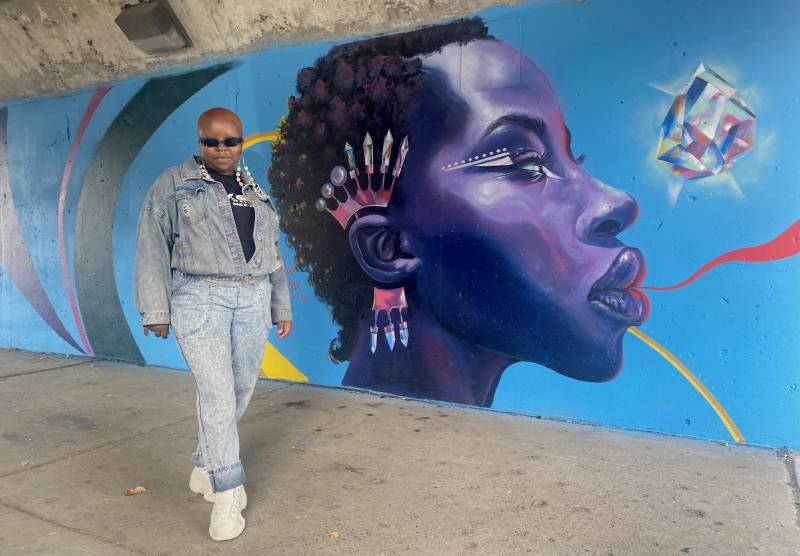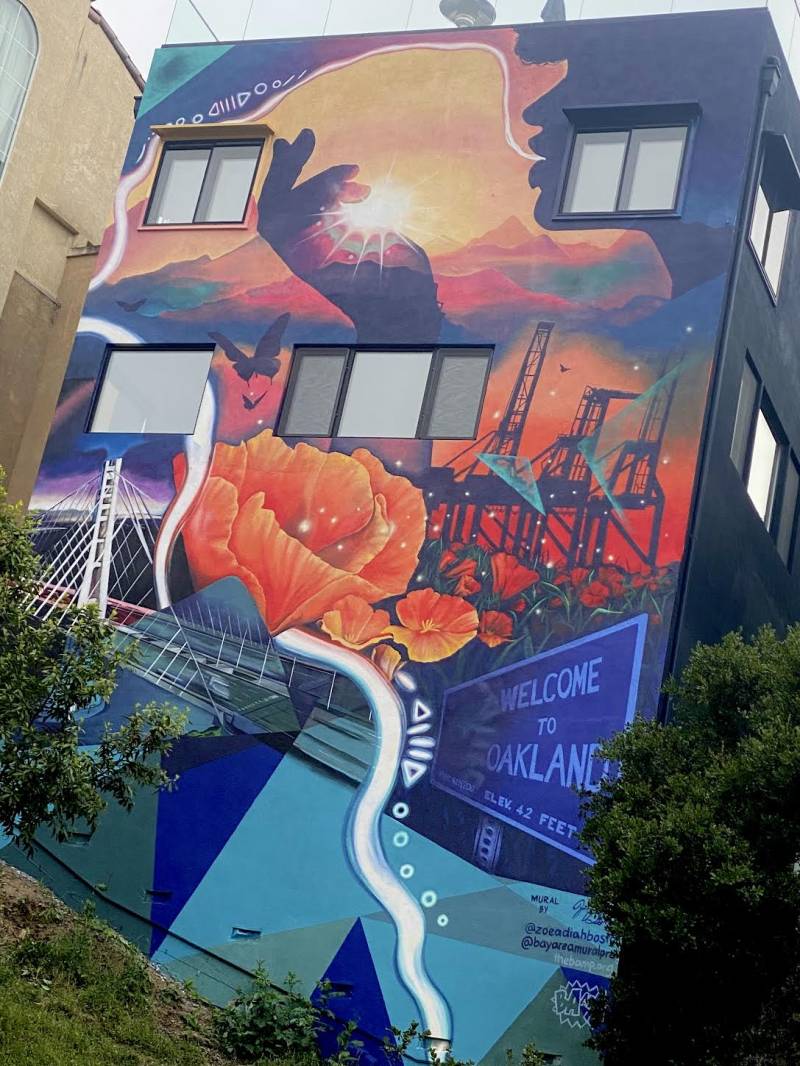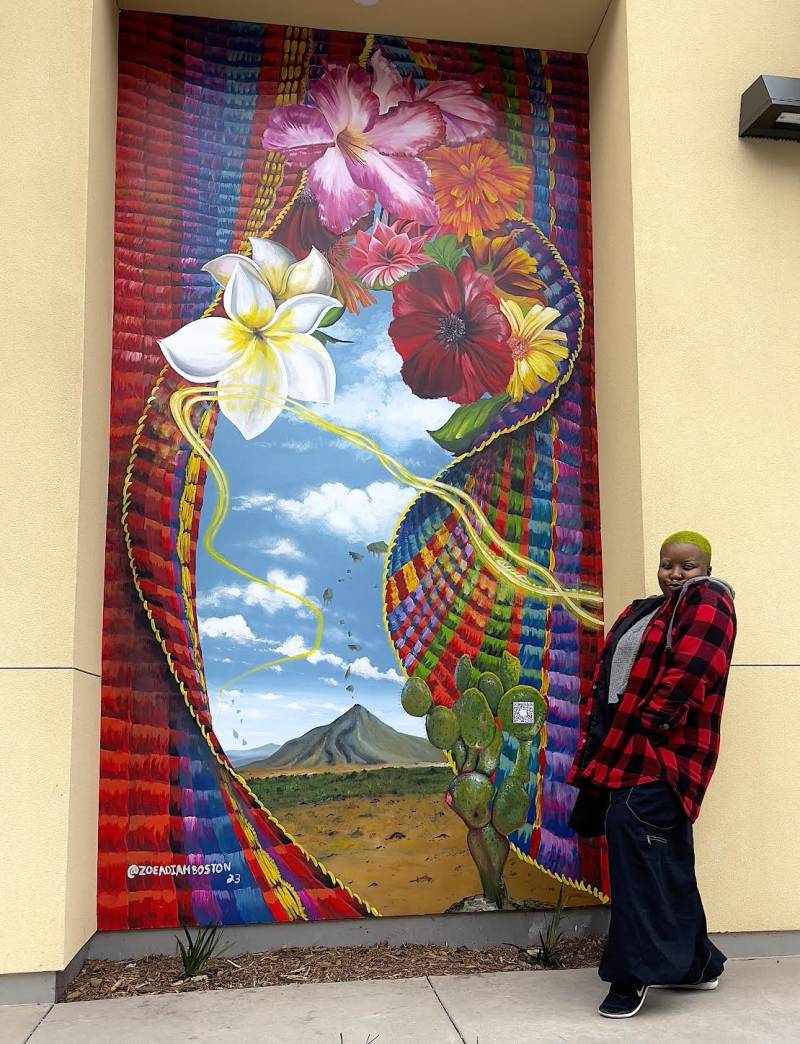View the full episode transcript.
Zoë Boston is a talented artist who takes the highs and lows of life, and creates moving works of art of all sorts.
She paints huge, brightly-colored murals depicting otherworldly beings, with elements of Afrocentrism and scenes inspired by nature. She also does acrylic-based paintings on canvas, smaller in stature but just as powerful. She’s a fashionista, who knows how to put an outfit together– accessories and all. She’s a writer, of both short journal-like essays and profound lyrics for songs. Plus she’s a talented vocalist.

In her 2023 single, “Murky Waters,” Zoë sings, “We said ‘friends for life,’ didn’t know I was signing mine over,” as she unpacks her experience of surviving an abusive relationship.
Zoë, who was born in Southern California and spent some time on the East Coast, found a home in Oakland nearly a decade ago. She initially moved here to be part of a media production team. During that time, however, Zoë says she had unintentionally become a part of a cult and was also sexually assaulted.
From that low point she’s built herself up, as well as her art and her community. And it’s this community, namely members of the Bay Area Mural Program, who’ve come to truly see Zoë when she needed it the most.

Earlier this year, as bills piled up and money got tight, Zoë created a GoFundMe campaign in order to stay afloat as an artist in the Bay Area. People rushed to her aid, offering over the amount that she asked. A few days later Zoë got some news that was a bit of a cherry on top, as she and fellow visual artist Timothy B. were awarded a contract through the East Bay Asian Local Development Corporation (EBALDC) to paint a mural on a forthcoming low-incoming housing project in West Oakland.
Through all of the ups-and-downs of life in the Bay Area, Zoë has relied on community, art and a commitment to personal growth. And this week on Rightnowish, we talk about it all.

Episode Transcript
[Music]
Pendarvis Harshaw, host: What’s up, y’all! Welcome to Rightnowish, I’m your host Pendarvis Harshaw.
Today we’re talking to Zoë Boston. She’s an artist, excuse me, an artiste. And she can express herself in a number of ways. She paints huge aerosol pieces depicting Afrocentric figures with Bantu knots and locs, posing in empowering positions and surrounded by bold colors. They adorn the walls of well-known Bay Area hangouts– like the Ivy Room over in Albany, Black Girls Greenhouse in Oakland and San Francisco’s Museum of the African Diaspora.
She also paints acrylic and oil based images of cosmic beings on canvases, much smaller than her aerosol pieces, but just as powerful. Plus, she’s a writer. Her essays are personal and reflective of self discovery. She can even sing when she chooses to.
Zoë had been on my radar for a while, but I hadn’t taken time to really study her work– until last fall. That’s when she piqued my interest with a track she dropped titled, “Murky Waters”
[Music]
As I followed her on social media, a few weeks later I saw that Zoë had found herself in a financial bind. Late on rent and bills piling up, she turned to her community for funding to stay afloat. I watched as the donations for her GoFundMe exceeded her ask.
And then, a few days later, a cherry on top: she was awarded a major contract to paint a mural on a low-income housing facility being built in West Oakland.
I knew then that it was time to talk. I had to know how Zoë was dealing with the highs and lows of life, and how she uses her many forms of art to handle all that comes with this roller coaster called living in the Bay Area.
More after this.
Pendarvis Harshaw: You saw some real interesting highs and some heavy lows in this past month or so. And, I wanted to start off with the good, some news that I saw that you and fellow artist Timothy B, well known visual artist and former Rightnowish guest, were awarded a contract by EBALC, the East Bay Asian Local Development Corporation, to do a mural on a forthcoming affordable permanent housing site, Phoenix Public Arts Project, in West Oakland. How does it feel to have that honor?
Zoë Boston: It feels full circle. It feels like divine timing. I feel like this year’s definitely a resurgence for me. And so, to be able to paint a mural on, um, an apartment complex that’s named the Phoenix is so fitting for me. Like, it seems like it’s meant to be for this year. And I’m extremely excited and, like, honored to be a part. And yeah, it’s going to be great.
Pendarvis Harshaw: Nice, have something to look forward to this year as they’re still building the actual facility. Right?
Zoë Boston: Yes, they’re still building it.
Pendarvis Harshaw: This good news comes on the heels of some pretty heavy news. At the start of January, you were vulnerable enough to make a public plea with folks, asking for assistance with your finances for living. You made a GoFundMe for a very specific ask of rent and bills totaling $10,255 and you got $11,119. How did it feel to have that kind of support?
Zoë Boston: It was honestly healing for me because I have struggled with asking for help in the past. Even to put the GoFundMe out there was an incredible feat for me, a breakthrough for me, just being seen in that way and being vulnerable in that way. Especially in the past when I’ve reached out for help in different avenues, I’ve been received with more social shame, or questions, or victim blaming, or ridicule, and so it was terrifying to even put the ask out there. But I knew that I had to get over my fear. You know, I was at a point where it’s just like, well, I need help.
Pendarvis Harshaw: When you say vulnerable, it wasn’t just rent and bills. It was also you being explicit about, um, a recent discovery that you had. In the GoFundMe it said you had a recent discovery that you are neurodivergent and somewhere in the autistic spectrum. I think that’s a very relatable experience for our generation, especially since people of color are historically underdiagnosed. What specifically were you experiencing that led to this discovery?
Zoë Boston: Well, honestly, since I’ve been born, I’ve always felt different. I’ve never really felt like I fit in.
The generation before us didn’t have the vocabulary and the tools to name some of the things that we are experiencing now. So I was just labeled as, you know, the oddball or like the black sheep of the situation. So you just sit with that. It’s like, well, I’m just I guess I’m just different.
It seems like I’m in a world that is not built for me and not designed for me. And no matter how hard I try to articulate what I’m experiencing, I get invalidated based on other people’s perception of me and other people’s understanding of my experiences.
What started it was just this self-healing journey after escaping a cult and dealing with narcissistic abuse and sexual assault. Like, I went on a journey of self healing and understanding. Because I got to a point where I realized, like, okay, like I’m reaching out and looking outward to be validated and seen and heard. But reality is, I need to understand myself and validate myself and see myself so I can heal and move past this.
And so I started off with mental health. I started off with learning about narcissistic abuse. I started off learning about cult culture. And, you know, you go down these bunny trails and you start finding things about neurodivergence and you’re like, ‘wait, I relate to this.’ Like, well, that’s interesting. And then you just keep reading like, ‘wait, I relate to that too.’ And you keep reading and you’re like, ‘wait, I’ve never been able to articulate this feeling,’ and someone else has found the words for me like, ‘wait, oh my goodness, there’s a whole community of people like this?’
That’s like, you know, you go through these processes of like, well, maybe I’m not really neurodivergent, maybe I just want attention, or maybe I’m just like trying to find a solution.
And you keep doing research and you realize like, yeah, well, this all fits, and it makes my entire life make sense. It allowed me to really understand that I’m not broken or flawed, I’m just different. And there’s a whole community of people who are different, like me.
Pendarvis Harshaw: Being seen and seeing yourself as well. Like doing the self-discovery, the research, as you mentioned, and the trauma that you navigated is heavy stuff. And it’s, it’s something that you put into music as well. You’re not just a visual artist. And in 2023, you dropped a track, “Murky Water.” What’s the meaning behind the lyrics in that song?
Zoë Boston: It’s a narrative story of my experience going into the environment I was in at the cult and experiencing assault and betrayal, and betrayal, trauma and all the things associated with it.
[Music-Clip from Murky Waters by Zoë Boston]
We said friends for life, didn’t know I was signing mine over. You said I could trust you…
I actually wrote it in 2021, and it was at a point where I wasn’t really writing that much anymore. I was kind of stagnant and like… stuck in my own trauma and trying to understand the world.
And it hit me. I was like, oh, it’s time. It’s time to tell that story. And I don’t even think I was fully prepared for it, because the way, like, the first line came out, “Can’t see around me, can’t feel my body no more,” and from there, it just… everything poured out, line for line. Every line rhymed and I was able to articulate this story so perfectly.
[Music]
Like, I remember I couldn’t stop listening to it for like weeks. I remember the first 24 hours I couldn’t stop crying, it was such a supernatural release. And I’m grateful to God that I tapped into that source to release that because it definitely was a catalyst to my own healing.
And I sat with it for a couple of years, didn’t know exactly what to do with it. But I got to the point where I knew that, you know, if I experienced something like this, maybe it’s not as common, but I know there’s other people who have been through situations like this and don’t have the words, don’t have the vocabulary to articulate the complex and deep feelings that they’ve experienced.
Pendarvis Harshaw: Without reopening old wounds. I’m wondering if there’s a way to shed light on what you experienced. Just so people can understand what you’ve traversed.
Zoë Boston: 2014, I came to the Bay area to visit a production company. It was a one stop shop where artists could come and get their ideas out. Everyone was working together as a team. You know, we had visual artists. We had singer songwriters. We had producers. We had mixing engineers. We had photography. We had graphic design. It was all state of the art, top, top, top. Like to this day, some of the people I’ve met there are still some of the most gifted people I’ve ever met in my life.
It was also tied to a church and so one of the stipulations was that you had to go to the church. But fast forward, I found out through unfortunate situations or circumstances that it was actually a cult. It’s very controlling and manipulative.
The CEO of the production company was also the pastor, also our mentor. Like, in hindsight, he had way too much power. Like, it’s funny how you see things after they happen.
He started to pretend like he was my friend and kind of get in my space and try to figure me out. And it turned into this accelerated grooming process, where I found myself being sexually assaulted by him. And through the shock of that, it opened my eyes to really see what was going on.
I am not where I thought I was. I am not in a safe place. This man who is professing to be a man of God is the farthest from God, the furthest from the truth, the furthest from light. But yeah, we confronted him. He still wasn’t accountable. And within a week, I made my way out of there, never to return. And so I’ve been dealing with the aftermath of that honestly, since then.
The release of the song definitely helped me to understand the full capacity of what I experienced.
It’s not like robes and it was not weird rituals and all these things, like, it was very covert, very normal from the outside looking in. It was very welcoming and warm. It was slow bait and switch for sure.
Pendarvis Harshaw: I’ve heard you talk before about using your craft to “alchemize” your experiences. What does that mean?
Zoë Boston: I think it’s part of my purpose and my calling to, you know, be an alchemist. But just the importance of taking, kind of taking the ugly and the dirt and the pain and the trauma that we’re experiencing and finding the golden nuggets in it, finding the learning lesson so that you actually can grow from it, and then transforming it in a way that it’s easy for others to also learn from the experience.
Pendarvis Harshaw: Is there something you do in that process that’s like the first step that allows you to make work out of these traumatic experiences?
Zoë Boston: The first step is stillness, rest, sitting with it for a while, almost like a germination process, if that makes sense, If you want to use the analogy of a seed, you know. It’s important to actually feel the emotions you’re feeling and not run from them.
I picture what has actually happened and then from there, I can create analogies and similes and metaphors to articulate what I’ve experienced, whether it’s visual or through lyrics.
Pendarvis Harshaw: Is there a form of art that is the first tool that you grab when you reach in your artistic toolbox?
Zoë Boston: Oh, man, it really depends on the urgency of the expression. So if it’s something that I’ve sat with for a while and I’m ready to share that story in a way, I usually will go towards, visual arts, like painting. So it just depends on the urgency for me, but I like to use both mediums.
Pendarvis Harshaw: And then your paintings we’re in an audio medium right now, but in describing the visuals that you paint, like I’m looking at, like, extraterrestrial metaphysics. There’s universal elements, Black bodies, empowerment. I’m seeing a lot of bright colors and just taking it in it’s, it’s definitely something to, like, sit and engage with. What do you want the audience to gain from your work?
Zoë Boston: I want them to remember that they are supernatural. And I want people to remember that anything is possible. And I think we’re in such a capitalist society that we forget how extraordinary we are. We forget that, you know, we’re tapped into this infinite, supernatural energy source and that we really have the power to manifest and move things in a way that I think we’ve kind of grown dull to. And so I want, through my art, I want people to remember who they are. I want people to remember that they have the power to change their lives.
[Music]
Pendarvis Harshaw: Amen. Thank you for that. Thank you. Big thank you to Zoë Boston, I hope you keep painting. I hope you keep creating. I hope you keep being seen!
As I mentioned, her work can be found around the Bay Area, and you can find Zoë directly on social media, her Instagram handle is ZoeAdiahBoston.
This episode was hosted by me, Pendarvis Harshaw. It was produced by Marisol Medina-Cadena and Maya Cueva. It was edited by Chris Hambrick.
Our engineer is Christopher Beale. And Sheree Bishop is the Rightnowish intern. The Rightnowish team is also supported by Jen Chien, Ugur Dursun, Holly Kernan, Xorje Olivares, Cesar Saldaña, and Katie Sprenger.
Thank you all for listening! Until next time, peace.
Rightnowish is a KQED production.

Rightnowish is an arts and culture podcast produced at KQED. Listen to it wherever you get your podcasts or click the play button at the top of this page and subscribe to the show on NPR One, Spotify, Apple Podcasts, TuneIn, Stitcher or wherever you get your podcasts.


